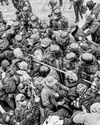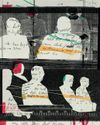
Can Forgetting Help You Remember?
Four times a year, I attend the Yizkor service at synagogue. Yizkor in Hebrew denotes “remembrance,” and the official name of the service, Hazkarat Neshamot, means a “remembering of souls.” During the service, I call to mind loved ones who have died—parents, grandparents, uncles, aunts, close friends—reliving shared times that were cherished, and some that were fraught. I think about what I learned from these people, several of whom were in my life from my first moments of awareness. I recall being taught to swim by my father, hearing my pious Russian grandmother’s tearful account of the Kishinev pogrom, standing by my father’s bedside as a medical student in an underequipped community hospital as he suffered a fatal heart attack. The Yizkor service at my synagogue ends with the Kaddish, the mourner’s prayer, and with a call to perform deeds of loving-kindness in memory of the departed.
Many religions and cultures have rituals structured around remembrance, a fact that suggests how central the ability to remember is to our sense of self, both as individuals and as communities. But how accurate are our memories, and in what ways do they truly shape us? And why does some of what we remember come to us easily, even unbidden, while other things remain maddeningly just out of reach, seeming to slip even further away the more we struggle to summon them?
Bu hikaye The New Yorker dergisinin May 20, 2024 sayısından alınmıştır.
Start your 7-day Magzter GOLD free trial to access thousands of curated premium stories, and 9,000+ magazines and newspapers.
Already a subscriber ? Giriş Yap
Bu hikaye The New Yorker dergisinin May 20, 2024 sayısından alınmıştır.
Start your 7-day Magzter GOLD free trial to access thousands of curated premium stories, and 9,000+ magazines and newspapers.
Already a subscriber? Giriş Yap

GET IT TOGETHER
In the beginning was the mob, and the mob was bad. In Gibbon’s 1776 “Decline and Fall of the Roman Empire,” the Roman mob makes regular appearances, usually at the instigation of a demagogue, loudly demanding to be placated with free food and entertainment (“bread and circuses”), and, though they don’t get to rule, they sometimes get to choose who will.

GAINING CONTROL
The frenemies who fought to bring contraception to this country.

REBELS WITH A CAUSE
In the new FX/Hulu series “Say Nothing,” life as an armed revolutionary during the Troubles has—at least at first—an air of glamour.

AGAINST THE CURRENT
\"Give Me Carmelita Tropicana!,\" at Soho Rep, and \"Gatz,\" at the Public.

METAMORPHOSIS
The director Marielle Heller explores the feral side of child rearing.

THE BIG SPIN
A district attorney's office investigates how its prosecutors picked death-penalty juries.

THIS ELECTION JUST PROVES WHAT I ALREADY BELIEVED
I hate to say I told you so, but here we are. Kamala Harris’s loss will go down in history as a catastrophe that could have easily been avoided if more people had thought whatever I happen to think.

HOLD YOUR TONGUE
Can the world's most populous country protect its languages?

A LONG WAY HOME
Ordinarily, I hate staying at someone's house, but when Hugh and I visited his friend Mary in Maine we had no other choice.

YULE RULES
“Christmas Eve in Miller’s Point.”